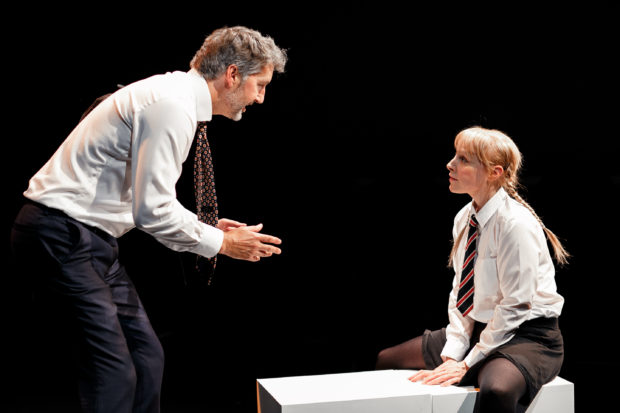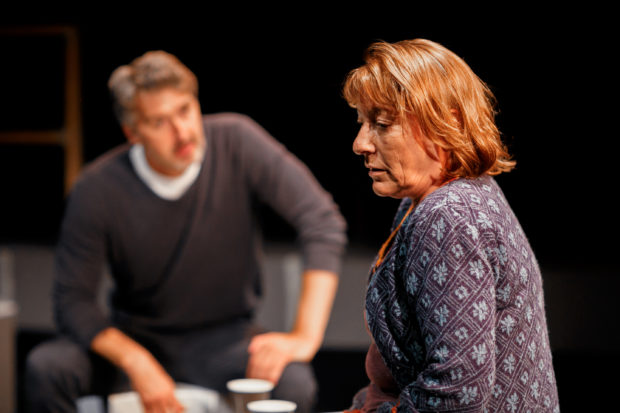You have no items in your cart. Want to get some nice things?
Go shoppingAbigail Hood’s new play, Spiral, unfolds a complex narrative about the life of Tom (Adam Morris) and Gill (Tracey Wilkinson) after their daughter Sophie goes missing. It centres on their lives literally spiralling into destruction and dependency in the aftermath of the disappearance: Tom on an escort who looks like his daughter, Gill on alcohol and conspiracies.
Spiral rejects any form of convention from the first scene. We are introduced to Tom and Leah (Abigail Hood), the escort, who is dressed as a school girl. At first the audience is gripped as to whether the play will be some type of homage to Lolita, with Leah merging discussions of school subjects with sly euphemisms.
Tom’s relationship with Leah dominates the play as he increasingly uses her to cope with the tragedy in his life. He is revealed to be a father who is grieving and lost without his daughter, trying to re-enact a relationship that means so much to him.
Perhaps this is the most refreshing part in Spiral. The story focuses on the father-daughter relationship, instead of the mother-daughter as would be expected. It gives an insight into a male perspective that is so often eschewed.
The relationship between Tom and Leah presents an unusual dynamic in which we see the two characters grow, change and influence the course of their lives together. It is one of the few moments of tenderness in the play, where the audience warms to this perceptibly unusual friendship and how they help heal each other.

Unfortunately, more often than not Morris’s performance as Tom is stilted and unbelievable in comparison to Wilkinson as his wife, who performs with force, emotion and nuance throughout. Yet Gill doesn’t seem to be a fleshed out character. During one scene, Tom is accused of being sexually inappropriate with some of the teenage girls at the school where he works. Gill instantly believes these accusations, and then further amplifies it by accusing him of doing the same to their daughter.
It raises the question of why Gill would react in this way when Tom has been depicted as anything but predatory, without even questioning him properly or waiting for the investigation to be concluded? It seems like Hood, rather than focusing in on the relationships and events that matter, relies on shock value which becomes tiresome rather than having the impact she may have intended.
An unexpected addition to the narrative was the relationship between Leah and her pimp/boyfriend Mark (Kevin Tomlinson). Mark is physically, sexually and emotionally abusive, which is expectedly uncomfortable to watch. However, like many parts of the play it disappointedly relies on class and gender stereotypes, thrusting to light the need to take a different approach to these issues.

The relationship between Leah and Mark does highlight the complexity of being in an abusive relationship: the excuses, the apologies, emotionally twisting events, going back when vowing never to again. At the same time, it draws parallels to Tom using Leah for his own devices. Leah is never seen as a person by the other characters, but merely a tool for the male gaze. It is one of the triumphs of Hood’s writing in this play.
The relationships and plot are rarely given the time to flourish and breathe due to the sheer amount of characters, relationships and events that Hood tries to cover. It may have been better for her to focus in on fewer events and characters in order to draw out the complexities of the relationships and the harrowing nature of the story.
With each scene change, another horrific or dramatic event unfolds – to the point where it becomes predictable. The characters and narrative aren’t given the chance to flourish, breathe or have the impact they should. The dialogue often relies on cliché and telling rather than showing. As a result, it makes it difficult to feel invested in the characters or believe in the events.
The play ends on a more positive note, with some form of relief that there are no further events to plunge the characters into more despair. After such overwhelming drama, the play’s conclusion lacks any real resolution. Like a spiral, some devastating life events never truly end.
Spiral will play at Park Theatre until 1 September.

About Michael Handrick
Michael Handrick was born in the UK and raised in various countries. A graduate from the Creative and Life Writing MA at Goldsmiths, University of London, his short stories have been published in various anthologies; his journalism appears in magazines such as PYLOT, as well as academic research published by The Inter-Disciplinary Press.




